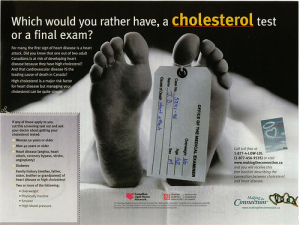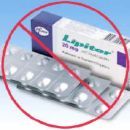Jun, Tue 26th, By : Dr John Briffa
Statins reduce cholesterol, and this is said to be the primary mechanism through which they reduce the risk of ‘cardiovascular’ events such as heart attacks and strokes. When used in clinical practice, statins can be given to people with or without prior history of cardiovascular disease. Giving statins to people with a history of cardiovascular disease (e.g. a prior heart attack or stroke) is known as ‘secondary prevention’ and generally gets better results than giving it to people with no such history (known as ‘primary prevention’). For example, statins in secondary prevention have been shown to reduce overall risk of death, while in primary prevention they have not.
A review published this week looked again at data from secondary prevention studies [1]. The purpose of the review was to pool the results of several (11) studies to see if there was any difference between the results obtained in women compared to men. There were statistically significant reductions in the risk of things like heart attacks, strokes and overall risk of death in men.
But in women, the results were different: there was no significant reduction in the risk of stroke nor overall risk of death. Even in the secondary prevention setting where results are generally best, no woman appeared to have her life saved by taking statins.
Now, one reason for this result might be that there were not enough women in the studies used in the analysis to detect a change. That might be true and we can’t tell one way or the other, unfortunately. Another explanation is, of course, is that statins don’t save lives in women, even in those at high risk of cardiovascular problems.
There’s a very interesting commentary that accompanies this review, written by two researchers from the London School of Hygiene and Tropical Medicine [2]. The researchers are keen to persuade us that statins work just as well in women as in men. They cite two meta-analyses which show benefit in terms of heart events (such as heart attacks) and ‘vascular events’ (total number of events such as heart attacks and strokes). However, the quoted data cannot tell us anything about risk of stroke alone, and crucially does not tells us anything about the key matter in hand: whether statins actually save women’s lives.
The researchers then go on to draw our attention to a study which was excluded from the most recent analysis (the so-called Heart Protection Study). The researchers add this into the data and appears to improve the results. The thing is, though, even when they put in this study, overall risk of death in women was (again) not reduced by a statistically significant amount.
But that does not matter to the researchers, because they maintain that statistical significance is not important. With this stance, these researchers cut themselves adrift from a central tenet of the scientific method and the interpretation of results. It seems some scientists, in order to positive spin on unexpected or undesirable results, will take a distinctly unscientific stance.
References:
1. Gutierrez J, et al. Statin Therapy in the Prevention of Recurrent Cardiovascular Events: A Sex-Based Meta-analysis. Arch Intern Med. 2012;172(12):909-919
2. Taylor F, et al. Statins Work Just as Well in Women as in Men: Comment on “Statin Therapy in the Prevention of Recurrent Cardiovascular Events”. Arch Intern Med. 2012;172(12):919-920
==========================================================================================================
Read the full article here.
A review published this week looked again at data from secondary prevention studies [1]. The purpose of the review was to pool the results of several (11) studies to see if there was any difference between the results obtained in women compared to men. There were statistically significant reductions in the risk of things like heart attacks, strokes and overall risk of death in men.
But in women, the results were different: there was no significant reduction in the risk of stroke nor overall risk of death. Even in the secondary prevention setting where results are generally best, no woman appeared to have her life saved by taking statins.
Now, one reason for this result might be that there were not enough women in the studies used in the analysis to detect a change. That might be true and we can’t tell one way or the other, unfortunately. Another explanation is, of course, is that statins don’t save lives in women, even in those at high risk of cardiovascular problems.
There’s a very interesting commentary that accompanies this review, written by two researchers from the London School of Hygiene and Tropical Medicine [2]. The researchers are keen to persuade us that statins work just as well in women as in men. They cite two meta-analyses which show benefit in terms of heart events (such as heart attacks) and ‘vascular events’ (total number of events such as heart attacks and strokes). However, the quoted data cannot tell us anything about risk of stroke alone, and crucially does not tells us anything about the key matter in hand: whether statins actually save women’s lives.
The researchers then go on to draw our attention to a study which was excluded from the most recent analysis (the so-called Heart Protection Study). The researchers add this into the data and appears to improve the results. The thing is, though, even when they put in this study, overall risk of death in women was (again) not reduced by a statistically significant amount.
But that does not matter to the researchers, because they maintain that statistical significance is not important. With this stance, these researchers cut themselves adrift from a central tenet of the scientific method and the interpretation of results. It seems some scientists, in order to positive spin on unexpected or undesirable results, will take a distinctly unscientific stance.
References:
1. Gutierrez J, et al. Statin Therapy in the Prevention of Recurrent Cardiovascular Events: A Sex-Based Meta-analysis. Arch Intern Med. 2012;172(12):909-919
2. Taylor F, et al. Statins Work Just as Well in Women as in Men: Comment on “Statin Therapy in the Prevention of Recurrent Cardiovascular Events”. Arch Intern Med. 2012;172(12):919-920
==========================================================================================================
Read the full article here.




















